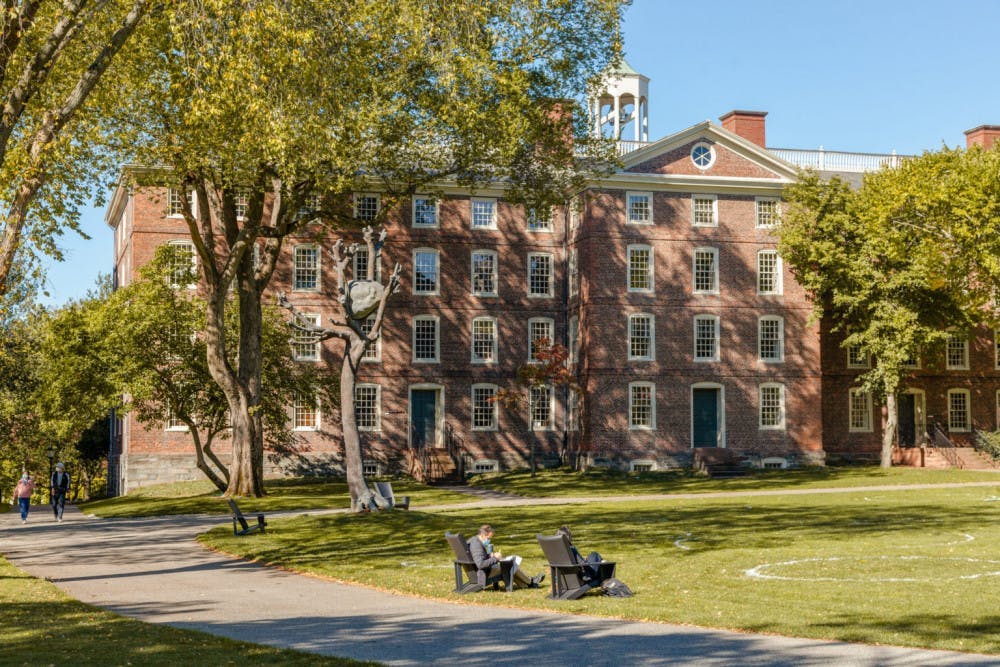The Supplement is a new series and newsletter by The Brown Daily Herald aimed at providing applicants to the University, and their families, with student and admissions officer perspectives on the application process, as well as other admissions news. To receive The Supplement in your inbox for the rest of the semester, you can sign up below.
In many ways, the University’s application process looks different than it did just a few years ago: Subject tests have gone by the wayside, other standardized tests are, for now, optional and video introductions have supplanted interviews with alums.
But essays — a personal statement for the Common Application, known colloquially as “the college essay,” and a pile of supplemental essays, unique to each college — remain at the heart of an application.
As it has for years, the University asks applicants to submit three supplemental essays — each 250 words — in addition to their Common App personal statement. For each of the four current first-year students who spoke to The Herald, making their essays stand out looked different, but they all found ways to convey their sense of self to an admissions committee.
Common App essay
When Dhruv Anand ’25, from the suburbs of Atlanta, sat down to write his college essays, he realized something: His high school had done him a “disservice” in its traditionalist approach to essay writing.
“Our entire lives, we’re forced to write argumentative essays,” said Anand, who is a prospective concentrator in either biochemistry or classics. “Five paragraphs, thesis, conclusion. And then boom, you get to senior year and you have to write to reflect your own interests.”
“I had never been forced to tell someone about myself in such a medium before,” agreed Karim Zohdy ’25, a first-year from Wales.
The first step of writing his personal statement for the Common App, Anand said, was finding his own voice. He decided upon a humorous approach — a style of writing he felt was authentic to himself.
“I knew I wanted to start with something off beat and comedic, to give an introduction to who I was as a person,” he said, “rather than trying to be someone serious, which I’m not.”
The resulting essay, an ode to wearing Hawaiian shirts, took him from May to October to perfect. He said he tied the shirts to his approach to the world — being open, friendly and extroverted. Before submitting his essay, he enlisted trusted teachers, his parents and other students look at it — though he was set on making sure the “final say” belonged to him.
More than a million applicants to universities and colleges using the Common App have to find a way to distill some critical aspect of themselves into a 650-word essay loosely responding to certain prompts.
Dean of Admission Logan Powell said that when applicants write their personal statement and other essays through the college process, authenticity outweighs all else.
“There are a lot of people in the college application process who want to weigh in with ideas and editorialize in a way that may change the tone of an essay to what they think we want to hear,” Powell said. “But what we want is to hear the student in their own voice, as clearly as they can possibly convey it. Don’t overthink it. Don’t ask yourself, ‘what do we want to read?’ Ask yourself, ‘what do I think I want to say?’”
Ayaka Ono ’25, a first-year from Tokyo, Japan, started her Common App essay by writing about a non-profit organization she had worked with throughout high school. But just a week before her early decision deadline at the University, a person with whom she was working to shape her essay told her to start over.
Instead, she wrote about poetry — a hobby that she largely engages with in private — and even finished her personal statement with a poem partially in English and partially in Japanese. It came together in an essay straying from cultural norms.
Sofia Barnett ’25, a first-year from Frisco, Texas, said she wrote and rewrote her Common App personal statement “14 or 15 times,” with the help of a counselor provided by a program for low-income college applicants. She eventually landed on an essay explaining how a traumatic experience growing up had led her to want to seek truth and pursue a career in journalism.
“I don’t feel like (my essays) could have been written by anybody else,” Barnett said, “because they were so specific to me.”
Supplemental essays
“Supplemental essay questions change year-to-year,” Powell explained, adjusting to what high school students are experiencing at the time. A group of admission officers and the Office of Admissions counselor advisory board — comprised of high school college counselors that periodically advise the office — helped inform the office regarding what was on students’ minds. The Office of Admission also consulted with a number of other University community members, including President Christina Paxson P’19 and Provost Richard Locke P’18.
This year, the University’s three questions include one about how students would explore the open curriculum — a mainstay of Brown’s application — another about being challenged by a different perspective and a third about what brings them joy.
“We will always find a way to ask students about the Open Curriculum,” Powell said. “The second question for us is an opportunity for us to learn more about … how (students) engage in constructive dialogue with people who see things differently than they do.”
“I would call the third essay ‘joy,’” Powell added. “In a really complicated and difficult world where there is a lot of anxiety and turmoil, there are still those things students do that bring them joy. We think it’s important for them to take a moment and think about what those things are.”
Anand, for his supplements, wrote about his love of the classics in response to a question about the Open Curriculum, and his fondness for building models, and building things in general, in response to a question about how he would contribute to the University community. Barnett, for her supplements, wrote about how Brown could help her become a better journalist.
For Ono, the work she did with the non-profit translated to a supplemental essay about contributing to the community, she said, while she focused on her family’s dinner table as the subject of an essay about a place she calls home.
And Zohdy said he had “fun” with his supplements — taking risks on a few. His answer to the question about home stuck out to him: Though he identifies as being from Wales, he lived in Canada, and his parents are from different places entirely. From there, he tied the essay to his love of literature and books.
“You have to set yourself aside, make yourself stand out with something that is unique to you,” Barnett said.

Will Kubzansky was the 133rd editor-in-chief and president of the Brown Daily Herald. Previously, he served as a University News editor overseeing the admission & financial aid and staff & student labor beats. In his free time, he plays the guitar and soccer — both poorly.





